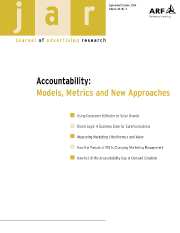Article contents
Curiosity versus Disbelief in Advertising
Published online by Cambridge University Press: 19 June 2003
Extract
Certain housewives found something “hard to believe” in a food advertisement; others did not. But the same per cent of both groups showed increased willingness to serve the product advertised.
For Years Communications Practitioners have been vitally concerned with their believability. Since Aristotle's famous treatise on rhetoric, propagandists, ministers, writers, advertisers and other professional persuaders have sought the key to belief. The one group which has paid most attention to the believability of persuasive communications is advertisers.
Two basic premises have been implicit in advertisers’ traditional investigations of believability: first, that there are two alternative and mutually exclusive audience reactions to an advertisement once it has been noticed and understood: people will either believe it or disbelieve it; and second, that consumers’ overt analyses or ratings of an ad's content predict its effect.
- Type
- Research Article
- Information
- Copyright
- Copyright © The ARF 2000
- 4
- Cited by


